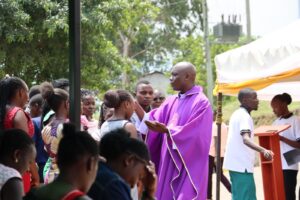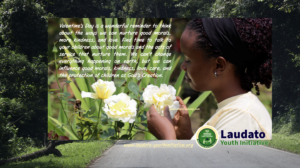The Initiative is grounded in the belief that equipping youth with environmental education will cultivate a generation of environmentally conscious leaders who can inspire humanity to become better stewards of the Earth.
On 13th March, we presented a paper at the University of Nairobi Literature Conference, where our esteemed Laudato Youth Research Editor, Mr. Augustine Bahemuka, a peace scholar, social justice advocate, also doubling as a social environmentalist and Publications Editor, Ms Immaculate Kisembo, a teacher of English Language and Literature at Holy Cross Lake View S.S.S Jinja with specialization in Linguistics, dedicated to the fields of language documentation, preservation, mental health and environmental education presented an enlightening paper titled
The Role of the Youth in the Promotion of Peace and Humanity.
This conference underscored the vital contributions of young people in addressing pressing global issues, particularly climate change and peacebuilding.
The presentation emphasized the growing recognition of the pivotal role that youth can play in tackling climate change and environmental degradation throughout Africa. Research indicates that young individuals possess the creativity and political engagement needed to advocate for sustainable solutions and hold leaders accountable (Barford et al., 2021a).
A study highlighted in Johnson et al. (2013) further reveals that East African youth are eager to engage as responsible citizens, disseminating critical information to their communities and becoming agents of change in environmental conservation. The conversation about youth-led climate action in Africa can be viewed through two lenses: marginalization, which addresses the exclusion of youth from policymaking, and mobilization, which amplifies their voices through civic engagement and activism (Anyidoho et al., 2012).

The Laudato Youth Initiative: A ray of Hope
Founded in 2022, the Laudato Youth Initiative (LYI) aims to empower young people in Uganda to combat environmental challenges and promote sustainability, inspired by Pope Francis’ encyclical, Laudato Si’ (2015), the catholic social teachings, the desire to respond to SDG13 and National Environmental Laws.
The Initiative is grounded in the belief that equipping youth with environmental education will cultivate a generation of environmentally conscious leaders who can inspire humanity to become better stewards of the Earth. Evidence suggests that enhancing young people’s capabilities to confront climate-related issues is essential for fostering a sustainable future in Sub-Saharan Africa (Johnson et al., 2023).
LYI seeks to inspire young leaders through a variety of programs that connect them with peers and mentors across a network of twelve Laudato Si Clubs in East Africa. These clubs facilitate activities focused on five key areas: tree planting, climate education, research and publications, Raising awareness through Media and sustainable environmental projects.

Fostering Climate Action and Peace Through Education
- Enhancing Ecological Knowledge: The Initiative prioritizes environmental education, enabling members to share knowledge about climate change and its impacts. Regular meetings, workshops, and conferences foster peer learning based on shared experiences. Participants discuss the detrimental effects of human activities on the environment—such as deforestation and poor waste management—and exchange practical solutions for conservation. Engaging in activities like tree planting and environmental clean-ups not only raises awareness but also inspires activism among youth.
- Developing a Sense of Ecological Responsibility: Hands-on experiences with nature, including tree planting and environmental clean-ups, are central to LYI’s activities. Members learn to nurture trees, focusing on planting fruit and indigenous varieties that benefit both the environment and communities. This transformative experience instills confidence and a sense of responsibility in youth, motivating them to seek solutions to ecological and social challenges.
- Promoting Self-Care through Nature: The importance of mental health awareness in educational settings is increasingly recognized, as many adolescents face mental health challenges. The Initiative creates spaces where young people can express themselves freely while engaging with nature. Activities like planting trees and walking in biodiverse areas cultivate mindfulness and appreciation for the environment. This connection enhances self-care among participants, enabling them to take better care of their mental and physical well-being.
- The Laudato Youth Initiative utilizes various media platforms such as social media campaigns, podcasts, videos, and webinars to educate and engage young people about climate change. By sharing impactful stories, providing resources, and encouraging community involvement, they aim to inspire action and foster a collective commitment to environmental stewardship.
The need to integrate mental health awareness in education institutions has attracted increased attention, as it is critical in enabling learners to thrive holistically. The global picture revealed by WHO (2024) raises serious concern as one out of seven adolescents (10-19 years) experiences a mental disorder; and even worse, suicide ranks third among the leading causes of death among those aged 15–29 years.
These findings are parallel to Uganda where nearly 20% of adolescents experience mental health challenges; and suicide cases reported among learners in school are on the rise (WHO, 2021; Daily Monitor 2025). Adolescence is a critical stage in human development given the physiological and physical changes learners experience; amidst rapid sociological, digital and ecological changes in their surroundings.
Yet, studies on mental health in children and adolescents recommend orphans, HIV/AIDS-affected youth, former child soldiers and refugees as high-risk groups (Iversen et al., 2021); however, omit children from climate-affected areas. The government has initiated programs aimed at promoting mental well-being among students, with emphasis on the importance of peer support and counselling services, which can create channels for open and free communication for learners (MoES, 2022).
However, there is a need to broaden the spaces for learners to express themselves freely outside the classroom environments, where they can not only interact with each other, but with nature (Kisembo, 2025). The Initiative has a network of school clubs in both primary and secondary schools through which learners freely interact with each other, and nature as they participate in activities such as planting trees and flowers, and weeding young trees, and nature walks, inter alia. Connection with nature has a therapeutic calming effect as it draws individuals to mindfulness, gratitude and appreciation of nature, thereby cultivating a sense of responsibility to protect and conserve the environment.
This sense of care for the environment transposes into a sense of self-care among learners, which enables them to take care of themselves, mentally and physically.
The insights shared at the University of Nairobi conference reinforced the essential role of youth in driving climate action and peace initiatives. As they engage with their communities and advocate for sustainable practices, young people are not only addressing environmental issues but also fostering a culture of peace and responsibility for future generations.
The Laudato Youth Initiative stands as a testament to the power of youth-led movements in creating lasting change across Africa and beyond.
World Health Organization (WHO). (2024, October 10). Mental health of adolescents. Retrieved from https://www.who.int/news-room/fact-sheets/detail/adolescent-mental-health#World Health Organization (WHO). (2021). Mental Health in Adolescents: A Global Perspective. Geneva: WHO
Daily Monitor. (2025, March 06). Introduce mental health sessions in our schools. Retrieved from https://www.monitor.co.ug/uganda/oped/editorial/introduce-mental-health-sessions-in-our-schools-4953084
Iversen, S.A., Nalugya, J., Babirye, J.N., Engebretsen, S.I. & Skokauskas, N. (2021). Child and adolescent mental health services in Uganda. Int J Ment Health Syst, 15(66). https://doi.org/10.1186/s13033-021-00491-x
Kisembo, I. (2025, February 24). Mental health support in education institutions. Retrieved from https://laudato-youthinitiative.org/2025/02/24/mental-health-support-in-educational-institutions/
Ministry of Education and Sports (MoES). (2022). National policy on mental health in education. Kampala: Government of Uganda.https://doi.org/10.1186/s13033-021-00491-x
Kisembo, I. (2025, February 24). Mental health support in education institutions. Retrieved from https://laudato-youthinitiative.org/2025/02/24/mental-health-support-in-educational-institutions/
Ministry of Education and Sports (MoES). (2022). National policy on mental health in education. Kampala: Government of Uganda Laudato Youth Initiative (LYI). (2025, March 01).
Investigating heat waves in Uganda. Retrieved from https://wp.me/pfYoTF-fz
Nabakooza, T. (2025, March 03). Finding my voice. Retrieved from http://wp.me/pfYoTF-fzv Laudato Voices













